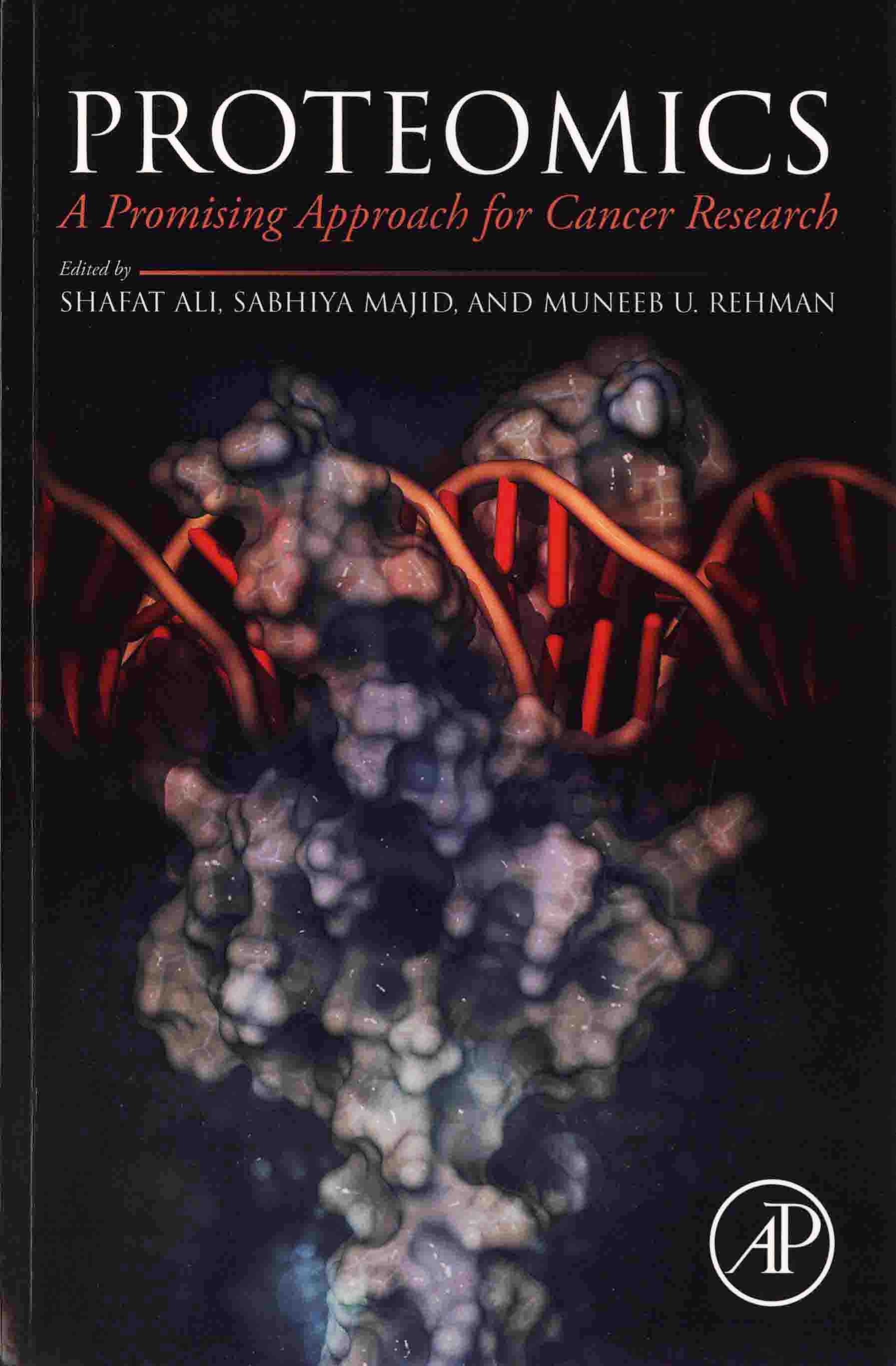 |
Proteomics : a promising approach for cancer research / edited by Shafat Ali, Sabhiya Majid, Muneeb U. Rehman. -- London ; San Diego, CA : Academic Press, an imprint of Elsevier, 2023. – (64.8057/P967) |
Contents
Contributors
Preface
1. Cancer proteomics: An overview
1. Introduction
2, Definition and goals of proteomics
3. Methods of protein measurement and biomarker identification
4. Biomedical applications
5. Mechanisms of proteomic changes in cancer
6, Cancer biomarker applications
7. Protocols for developing tumor biomarkers
8. General guidelines for a good study design for biomarker discovery
9. Applications of proteomics research in various cancers
10. Can proteomics research findings in cancer be translated into clinically oriented research?
11. Conclusion
References
2. Proteomics: A groundbreaking development in cancer biology
1. Introduction
2. Why proteomics?
3, Types of proteomics
4, Proteomics: Analytical approaches
5. Conventional techniques
6. Advanced techniques
7. Gel-based approaches
8. Quantitative techniques
9. High-throughput techniques
10. Proteomics: A breakthrough in cancer
11. Oncoproteomics
12. Proteomic variations in cancer
13, Necessity of proteomics in cancer
14. Heterogeneity in cancer
15. Detecting tumor aggressiveness
16. Personalized cancer treatment
References
3. Proteomics: Application of next-generation proteomics in cancer research
1. Introduction
2. What is proteomics?
3. Techniques in proteomics
4. Proteomics in cancer research
5. What is next-generation proteomics?
6. Edman sequencing
7. Protein microarray
8. Functional protein microarray
9. Analytical protein microarray
10. Reverse-phase protein microarray
11. Mass spectrometry-based proteomics
12. Advancements of MS technique in cancer research
13. Applications of MS in cancer research
References
4. Proteomics approaches in the identification of cancer biomarkers and drug discovery
1. Introduction
2. Proteomics and cancer biomarkers
3. Proteomics and drug discovery
4. Current techniques and advancements in proteomics
5. Challenges in proteomics
6. Conclusion
References
5. Proteomic profiling and its applications in cancer research
1. Introduction
2. Proteomic alterations in cancer
3. Analytical approaches of proteomics
4. Applications of proteomics in cancer
5. Applications of cancer biomarkers
6. Tumor aggressiveness detection
7. Lung cancer
8. Breast cancer
9. Ovarian cancer
10. Established biomarker panels: Their usefulness, challenges, and emerging potential
11. Prostate cancer
12. Conclusion
References
Further reading
6. Role of proteomics in surgical oncology
1. Introduction
2. Surgical oncology
3. Proteomic techniques in surgical oncology
4. Mass spectrometry
5. MALDI MSI (matrix aided laser desorption ionization mass spectrometry imaging)
6. SELDI-TOF MS
7. Laser capture microdissection (LCM)
8. Proteomics techniques used cancer biomarkers with special reference to surgical oncology
9. Gastrointestinal cancer biomarker and proteomics
10. Lung cancer biomarker and proteomics
11. Bladder cancer and renal cancer
12. Prostate cancer biomarker and proteomics
13. Brain cancer and proteomics
14. Leukemia and proteomics
15. Conclusion
Acknowledgment
References
Further reading
7. Applications of mass spectroscopy in understanding cancer proteomics
1. Introduction
2. Mass spectrometry-based diagnostics
3. Mass spectroscopy imaging
4. Protein MSI in cancer research
5. Drug imaging in cancer research
6. Application of MS in cancer biomarker discovery
7. Conclusion and future perspectives
References
8. Proteomic approaches in the study of cancers
1. Introduction
2. Proteomic approaches in cancer therapy
3. Proteomic approach in brain cancers
4. Proteomic approach in ovarian cancers
5. Proteomics approach in gastrointestinal cancer
6. Proteomics approach in lung cancer
7. Conclusion
References
9. Cancer proteomics: Application of case studies in diverse cancers
1. Introduction
2. Proteome study of gastric cancer
3. Proteome study of esophageal cancer
4. Proteome study of lung cancer
5. Proteome study of genitourinary cancer
6. Proteome study of breast cancer
7. Proteome study of ovarian cancer
8. Conclusion
Acknowledgment
References
10. The enduring interdependence of shotgun and targeted proteomics in cancer research
1. Introduction
2. Epidemiology of cancer
3. Hallmarks of cancer
4. Alterations in metabolism in cancer cells
5. Genomic studies maybe insufficient to study cancer cell behaviors
6. Traditional vs proteomic technologies
7. Shotgun proteomics approach
8. Targeted proteomics
9. Relevance of targeted proteomics in cancer
10. Advanced targeted methods
11. Sample sources for biomarker research
12. Applications of TP to major individual tumor types
13. Concluding remarks
References
11. Applications of proteomics in cancer diagnosis
1. Introduction to the mechanisms of proteomic changes in cancers
2. Proteomics techniques in cancer research: New and emerging methods, including prognostic methods
3. Proteomics research applications in various cancers
4. Conclusion
Acknowledgment
References
12. Application of plasma membrane proteomics to identify cancer biomarkers
1. Introduction to plasma membrane and plasma membrane proteomics
2. Plasma membrane protein alterations associated with cancers
3. Membrane proteins as tumor targets and biomarkers
4. Proteomics methods for study of plasma membrane proteins
5. Role of protein markers in cancer diagnosis
6. Membrane proteomics and biomarker discovery in various cancers
7. Conclusion
Acknowledgment
References
13. Utility of proteomics and phosphoproteomics in the tailored medication of cancer
1. Introduction
2. Precision biomarkers based on proteomics
3. Pathway and network analysis in proteomics
4. Integrated data approaches
5. Utility of proteomics and phosphoproteomics in commonly found cancers
6. Conclusion
References
Further reading
14. Proteomics: A modern tool for identifying therapeutic targets in different types of carcinomas
1. An overview of proteomics
2. Types of proteomics
3. Applications of proteomics
4. Fundamental applications of proteomics
5. Practical applications of proteomics
6. Proteomics in cancer
7. Analytical strategies of proteomics used in cancer research
8. Application of proteomics in understanding cancer growth and metastasis
9. Application of proteomics in cancer drug resistance
10. Application of proteomics in cancer treatment using immunotherapy
11, Proteomics in cancer biomarker identification
12. Creation of proteomics-based cancer databases
References
15. Cancer proteomics, current status, challenges, and future outlook
1. Introduction
2. Cancer proteomics
3. Cancer growth
4. Metastasis
5. Drug resistance
6. Proteomics approach in brain cancer
7. Extracellular vesicles as brain cancer biomarkers
8. Construction of cancer databases
9. Recent trends in proteomics
10. Challenges
11. Future prospective
References
Index